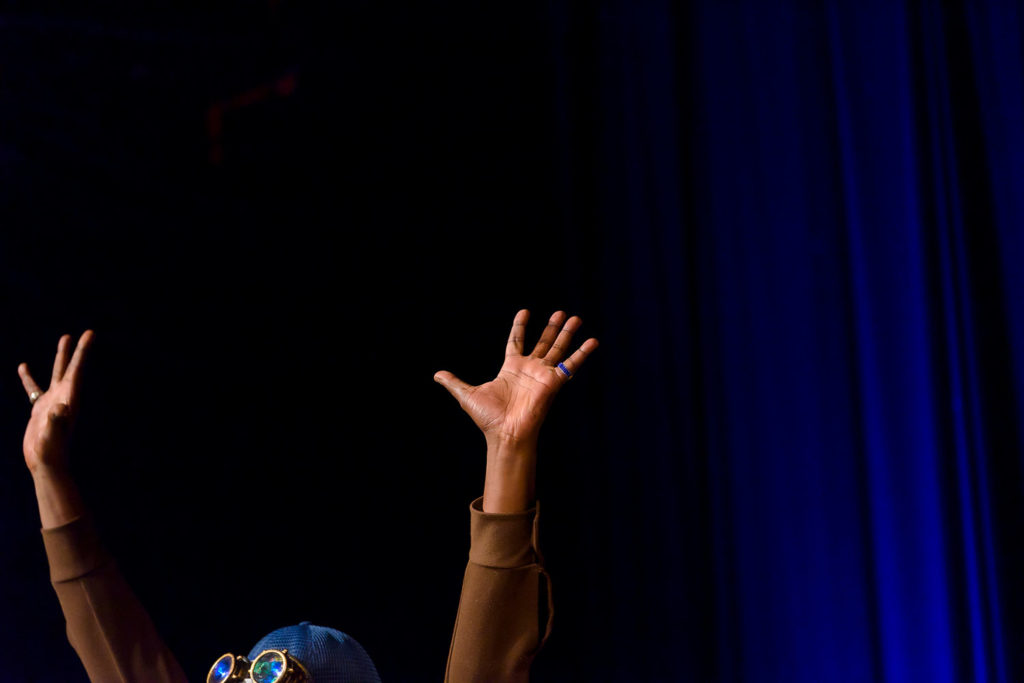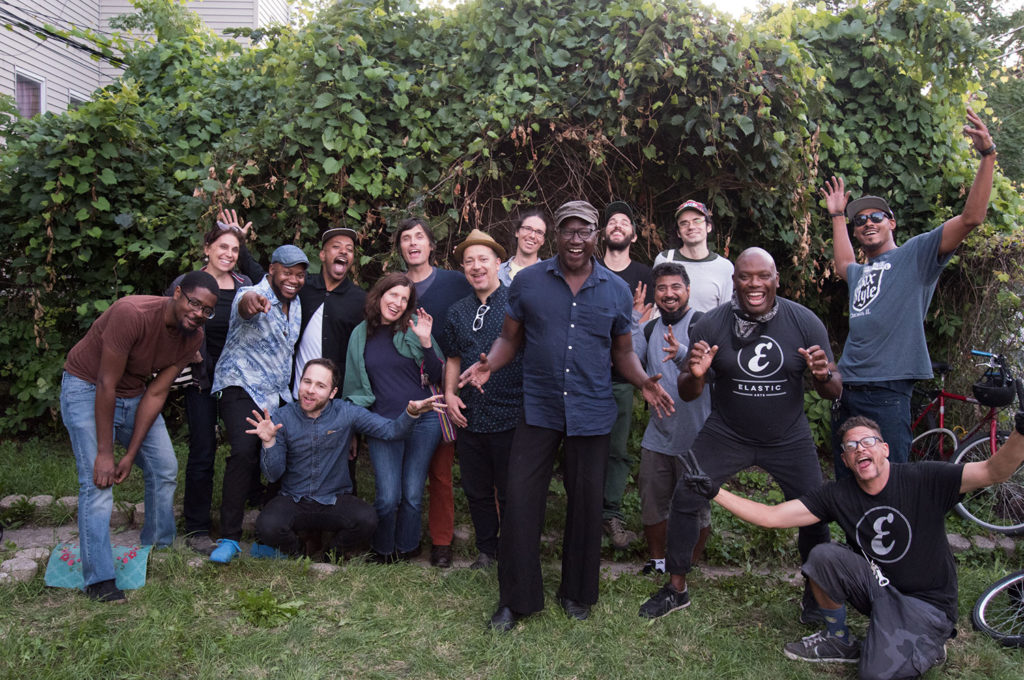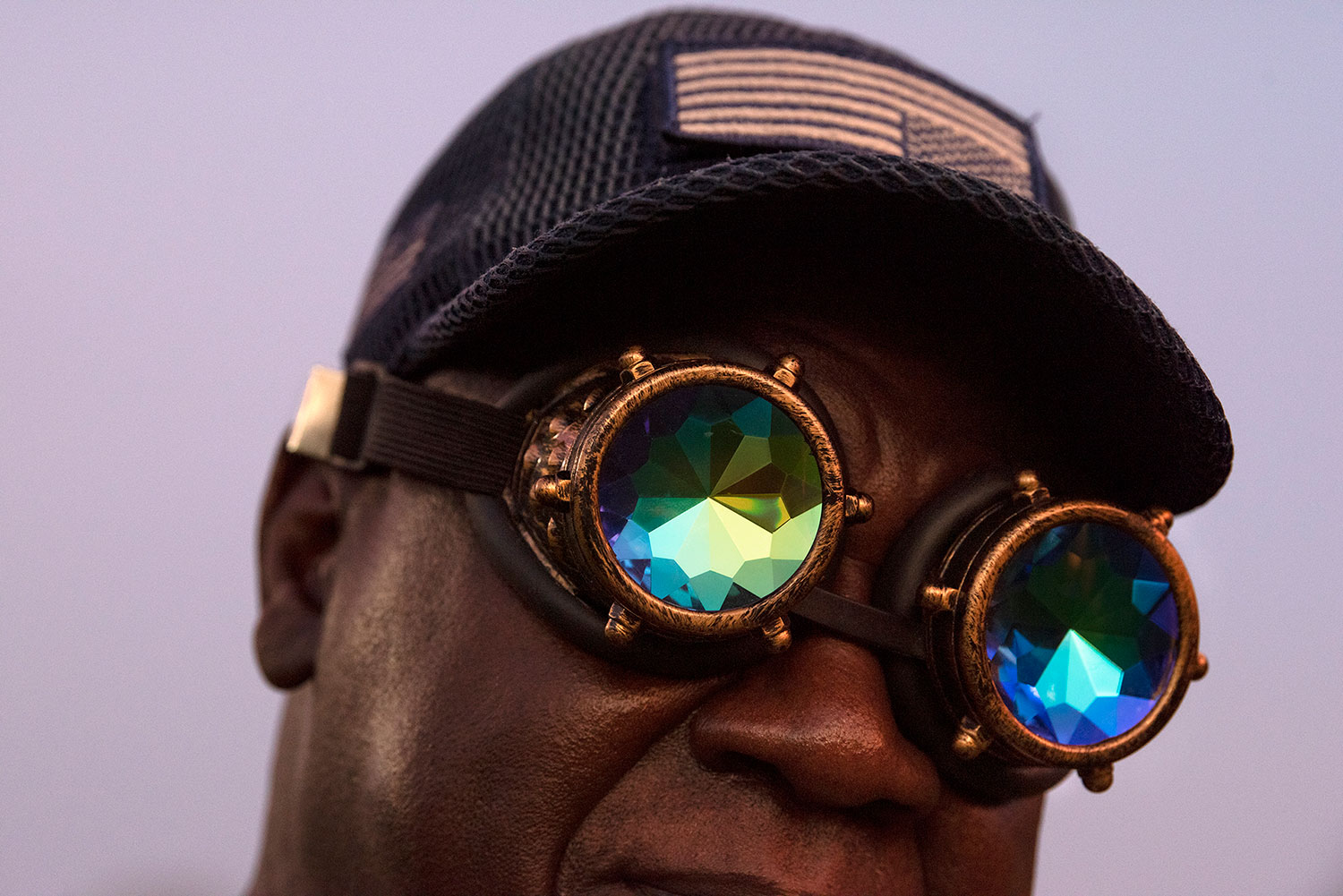Last September, Marvin Tate was drinking beer with friends during a break from bartending at Pitchfork Music Festival. He was in the crowd listening to Angel Olsen’s set when the singer gave him a shout out. She then covered a song called “Sidetracked in Miami.” Tate recognized the song — he wrote it.
“No one in the crowd knew who I was,” Tate says. “My friend jumped up and was like ‘This is Marvin Tate! This is Marvin Tate!’”
Tate is a multidisciplinary artist from the North Lawndale neighborhood. His life may be just as hard to pin down as his art: He speaks with a slight stutter but sings without it. In his twenties (he’s now 62), he spent a few months homeless and working as a stripper. He has a quirky fashion sense, sometimes wearing baggy sailor pants or a baseball cap with an American Flag turned upside down. When I ask him to describe himself, he tells me he looks like Idris Elba.
“People may debate that,” he says. “But I like that look.”
Olsen didn’t just sing Tate’s song at Pitchfork Fest. She worked with two other Chicago music mainstays — Tim Kinsella and Leroy Bach — to create an album covering his music. They and other Chicago artists have been influenced by Tate’s presence in the city for a long time: His CV spans 40 years and includes teaching workshops around Chicago, a spoken word performance on This American Life, live performances with his band D-Settlement, and a gig with the International Puppet Theater Festival.
“He’s just a really talented, genius-level performer and individual,” says Samuel J. Lewis, director of Chicago’s Elastic Arts Foundation and Tate’s good friend. “He has that old school way, but then he turns it completely on its head by being extremely futuristic and extremely modern.”
Tate doesn’t fit neatly into a genre. He can be atonal and doesn’t always sing so much as use his voice as an instrument. He’s an award-winning slam poet. In the middle of a piece, he might just break into a meow. His songs are far from mainstream, but they aren’t inaccessible. “Marvin has a knack for subtlety and humor in his songs and poetry, and I wanted to pay him respects,” Olsen says. “So many Chicago jazz and punk musicians work Pitchfork Fest every year, and I just wanted to tip my hat to him for being there too.”
“People want [to cover] him because of his internal expressiveness,” says Theaster Gates, a visual arts professor at the University of Chicago and Tate’s mentee and bandmate. “It’s his access to a certain kind of Black emotional depth and his tremendous poetic intelligence.”
Lately, Gates has been considering his own cover album of Tate’s work. “The two albums I want to do are Theaster sings Andrew Bird, and Theaster sings Marvin Tate as a kind of homage to two Chicagoans who have been touched with language.”
There is an honesty and individuality in Tate’s music that makes him the ultimate artist’s artist. Marvin does Marvin and he strives for authenticity. But he’s at the point in his career where he wants proper recognition.
“No, I’m not a household name. But I don’t think I would want to be a household name,” he says. “I just want to be appreciated for what I’ve done.”
Covers of Tate’s music are welcome, but there’s a discrepancy between whose experiences cultivated the music and who profits from that art in the end.

‘I Wasn’t Afraid to Be Vulnerable’
Growing up in North Lawndale, Tate painted his shoes bright colors and made necklaces out of pop tops. His ADHD hindered him from focusing in the classroom, but it also planted the seeds for Tate to become a fluid improviser. When kids would make fun of him and his twin Melvin for their stutters, he would either play with sound and stutter even more, or he would perform poems like Gwendolyn Brooks’ “We Real Cool” to demonstrate that he could speak like everyone else. When he said Brooks’ words, his stutter disappeared.
“I hung out with the nerds. All the pimp boys and cool cat girls didn’t like me,” Tate says. “I wasn’t afraid to be vulnerable or silly or strong or just bad.”
When Tate was 9, he saw his mother, Ophelia, get shot three times on Easter Sunday night. She survived, but the incident was transformative. While Ophelia recovered in the hospital, Tate stayed with his grandparents. He and his five siblings came back to the house to grab clothes, and Tate recalls the table was exactly how they left it on the day of the shooting. Plates were still there. Dishes had not been done. The leftovers were unmoved by time, but his world felt so different.
“Does art come out of tragedy? Is it those seconds of honesty where you connect with something?” he asks. “When I see piles of stuff, I have to make sense of it.”
Tate’s music speaks to those experiences growing up on the West Side. Often, he is playful and cheeky with his lyrics, but there is also a gravity to what he does. On his 2007 album, Family Swim, Tate is a master of emotional specificity. “Sentenced to life sitting on the porch sipping grape soda,” he sings, and you feel like you’re on the porch with him experiencing the languor of childhood. “Now you’re wanted on the most wanted list/ in over 50 states just because you couldn’t face the fact/ that I was right and you were wrong,” he brags on “My Technicolor Garden.” The beginning of the sentence is jaunty, plodding, yet chipper. By the end, it’s angry, fast-paced indie rock.
What’s more, Tate’s sexuality never fit neatly into a category. “I don’t identify as anything other than human,” Tate says. “I’ve always dropped word bombs sporadically in my poems and songs about sexuality and kink. I wanted my art to be felt by anyone who considered themselves an outsider, because that’s the way I’ve always and still feel like I’m being viewed.”
He calls himself insecure, and says he doesn’t always know what he’s doing — which leads him to improvisation. He pulls inspiration from any genre or media that fits his mood. “I don’t like reading poems. I like finding poems,” he says. “You’re responding to the musicians [in the band]. You’re responding to whatever’s in you.”

Due for His Credit
Lewis is grateful for the attention Bach, Kinsella, and Olsen brought to Tate’s lyrics, but he feels conflicted about the racial dynamic at play. “They will release an album of Marvin’s songs that gets so much more attention and acclaim than Marvin releasing an album of Marvin songs,” he says. “It’s like when Elvis Presley does a blues cover or when the Stones do a blues cover. It’s big, but the people who they get inspired by, not so much.”
Bach, creator of the Tate cover album and best known for his work with Wilco, appreciates this tension. “The issues of race and finance are incredibly important.” He says that going into the album, he made sure that Tate was a collaborator. “(Marvin) and I talked a lot about it, before I started working with Tim and Angel.”
Tate says he’s honored by the cover album. “I’m a Black man living in modern day America, and that’s who I am,” Tate says. “I don’t deny that. I don’t live in a colorblind society.” He also welcomes interpretations of his music from anyone and doesn’t want it to be put into a racial box. “My soul knows that it’s beyond (race) sometimes. Sometimes it is that. My goal is to be human.”
Bach hopes listeners will give Tate’s music attention and thought. “I just think his work is very unique,” he says. “If you just sit with his work and absorb it, it’s very important to these times, for this city, to the culture at large. But you got to sit with the stuff.”
Yet Lewis still contends that white artists may be more likely to profit off Tate’s work than the artist himself.
“Marvin is ground zero in that conversation of these wildly beautiful, crazy Black artists that are just moving to the beat of their own drum,” Lewis says. Often, he says, Black communities aren’t granted the freedom to be different. “I think what a lot of people don’t really understand is truly how conservative Black people are, and have been taught to be, because we have to play it safe. When you try to get wild, that’s when you end up getting hung, or you end up getting shot, or you end up getting incarcerated.”
As Tate ages, he feels more cognizant of the commercial side of being an artist. Lewis often razzes Tate about how he needs to think more about finances. “I’ve seen it so many times when people are amazing artists, and how does the story end? They died penniless in a homeless shelter,” Lewis says. “Why don’t we lift up these people who have entertained, educated, challenged, informed us for so many years? Why do they not get financially compensated?”
Tate has a couple projects on the horizon. He’s involved with various theater performances in the city, and he’s always creating and selling his sculptures. The 5 Points Arts Center in Milwaukee is showing Birds of Paradise, a collection of Tate’ sculptures of birds. He and Bach are working on new music with jazz trumpeter Jaimie Branch. A vinyl three-box set from his band D-Settlement is being re-released in the fall, a celebration of one of the most important eras in his career.
Gates says that now is the time we don’t just listen to cover songs of Tate’s music, but give him recognition in his own right. “Everybody’s familiar with Chance the Rapper and Kanye West… Lupe Fiasco,” Gates says, arguing that Tate is at the root of the Chicago spoken word scene that has launched generations of creative practitioners.
“Rarely is Marvin credited for being in that vanguard,” Gates says. “But I feel this is the moment we need to celebrate the intellectual power of poets like Marvin.”



